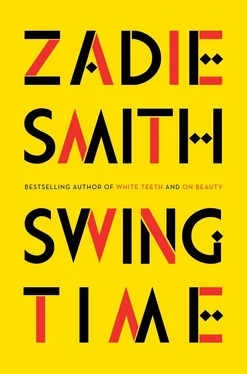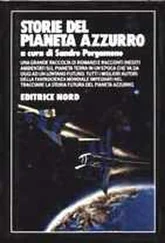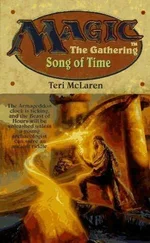“Who was that?”
“And so if you are ready,” whispered Lamin, wedging the huge thing into his back pocket, “this man will now take us across.”
We shared a narrowboat with the Black-British family. They tried to strike up a conversation with the guide concerning how far it was from the island to the mainland and whether any man, never mind one in chains, could conceivably swim through these fast-moving currents. The guide listened to them talk but looked so tired, the whites of his eyes obscured by the sheer number of broken blood vessels, and did not seem overly interested in hypotheticals. He repeated his mantra: “If a man reached the shore, he was given his freedom.” On the island we shuffled around the ruin and then queued to enter the “last resort,” a small underground room, ten by four, where “the most rebellious men, like Kunta, were held.” Imagine! Everybody kept saying this to each other, and I did try to imagine being brought down here but knew instinctively I was not the rebellious type, not likely to be one of Kunta’s tribe. Few people are. My mother I could certainly imagine down here, and Tracey, too. And Aimee — she was in her way another of the breed. But not me. Unsure what to do with myself I reached out to grasp an iron hoop in the wall to which these “most rebellious” had been chained at the neck. “Makes you want to cry, dunnit?” said the mother of the British family, and I felt it really should, but when I looked away from her in preparation, upward to the tiny window, I found the government guide laid out on his belly, his three-toothed mouth blocking almost all of the available light.
“You will now feel the pain,” he explained through the bars, “and you will need a minute alone. I will meet you outside after you have felt the pain.”
• • •
On the boat back I asked Lamin what it was he and Aimee had to talk about so often. He was sitting on the thwart of the boat and straightened his back, lifted his chin.
“She thinks I am a good dancer.”
“Does she?”
“I have taught her many moves she didn’t know. On the computer. I demonstrate our local steps. She says she will use them in her performances.”
“I see. And does she ever talk about you coming to America? Or England?”
“It is all in the hands of God,” he said, casting an anxious eye over the other passengers.
“Yes. And the Foreign Office.”
• • •
Lolu, who had been waiting patiently in his cab, drove up to the shoreline as we approached, and opened the car door, apparently intending to take me straight from the water to the car, another two-hour ride, without lunch.
“But Lamin, I have to eat!”
I noticed he’d been clutching the café’s laminated menu throughout our visit to the island and now he showed it to me, the vital, clinching piece of evidence in a courtroom drama.
“This is too much money for lunch! Hawa will make us lunch back home.”
“ I’ll pay for lunch. It’s, like, three pounds a head. I promise you, Lamin, it’s not too much for me.”
An argument ensued between Lamin and Lolu which, I was pleased to see, Lamin appeared to lose. Lolu put his hands on his buckle like a triumphant cowboy, closed the door of his car and rolled it back up the hill.
“It’s too much,” said Lamin again, sighing hugely, but I followed Lolu and Lamin followed me.
We sat at one of the picnic tables and ate fish in foil with rice. I listened to the talk at the neighboring tables, strange, uneven conversations that could not decide what they were: the heavy reflections of visitors to a historical trauma or the light cocktail chatter of people on their beach holiday. A tall, sun-ravaged white woman, in her seventies at least, sat alone at a table at the back, surrounded by piles of folded printed cloth, drums and statues, T-shirts that said NEVER AGAIN, other local merchandise. No one came near her stall or looked likely to buy anything, and after a while she stood up and began passing from table to table, welcoming guests, asking them where they were staying, where they were from. I was hoping we would have finished eating before she reached our table, but Lamin was a painfully slow eater and she caught us, and when she heard that I was not from any hotel, and not an aid worker and not a missionary, she took a special interest and sat down with us, too close to Lolu, who hunched over his fish and wouldn’t look at her.
“Which village did you say?” she asked, although I hadn’t, but now Lamin told her before I had an opportunity to be vague. The penny dropped.
“Oh, but you’re involved with the school! Of course. Well, I know people say the most awful things about that woman but I really love her, I admire her, honestly. I’m actually an American, too, originally,” she said, and I wondered how she thought anyone could be uncertain on this point. “Normally I don’t care for Americans, in general, but she’s the kind with a passport, if you know what I mean. I really find her so curious and passionate, and it’s a great thing for the country, all the publicity she brings. Oh, Australian? Well, either way she’s a woman after my own heart! An adventuress! Although of course I came here for love, not charity. The charity came afterward, in my case.”
She touched her heart, which was half exposed, in a multicolored spaghetti-strap dress with a frighteningly deep décolletage. Her breasts were long, red and crêpy. I was absolutely determined not to ask her whose love she had come here for, nor to what good deeds this act had ultimately led, but sensing my resistance, she decided, with an old woman’s prerogative, to tell me anyway.
“I was just like these people, just here on holiday. I didn’t mean to fall in love! With a boy half my age.” She winked at me. “And that was twenty years ago! But it was much, much more than a holiday romance, you see: together we built all this.” She looked around proudly at this great monument to love: a tin-roofed café with four tables and three items on the menu. “I’m not a rich woman, I was really just a humble yoga teacher. But these people in Berkeley, you only have to say to them: ‘Look, this is the situation, these people are in desperate need,’ and I can tell you, you’d be surprised, these people really just go for it, they really do. Just about everybody wanted to pitch in. When you explain what a dollar does here? When you explain how far that dollar’s gonna go? Oh, people can’t believe it! Now, sadly, my own children, from my first marriage? They have not been so supportive. Yes, sometimes it’s the strangers that sustain you. But I always say to the people here, “Don’t believe everything you hear, please! Because not all Americans are bad news, not at all.” There’s a big difference between the folks in Berkeley and the folks in Fort Worth, if you catch my meaning. I was born in Texas, to Christian folks, and when I was young America was a pretty hard place for me, because I was a free spirit and I just couldn’t find my place. But I guess it suits me a little more now.”
“But you live here, with your husband?” asked Lamin.
She smiled but did not seem overly enthralled by the question.
“In the summers. The winters I spend in Berkeley.”
“And he goes then with you?” asked Lamin. I had the sense he was conducting subtle research.
“No, no. He stays here. He has a lot to do here, all year round. He’s the big man round here and I guess you could say I’m the big woman back there! So it works very well. For us.”
I thought of that layer of girlish illusion Aimee’s new-mother friends all appeared to have lost, a kind of light in their eyes that had gone out, notwithstanding even their own celebrity and wealth, and then I looked into the wide, blue, half-crazed eyes of this woman and saw a total excavation. It hardly seemed possible someone could have had so many layers stripped from her and still be able to play her part.
Читать дальше












